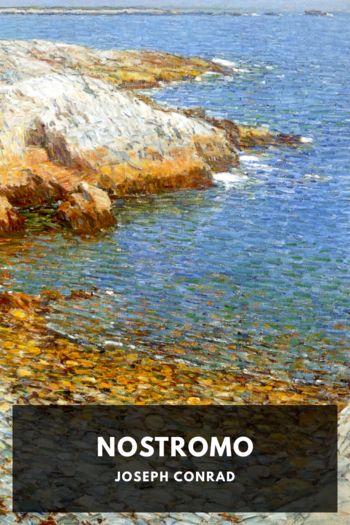Nostromo - Joseph Conrad (books to read fiction .TXT) 📗

- Author: Joseph Conrad
Book online «Nostromo - Joseph Conrad (books to read fiction .TXT) 📗». Author Joseph Conrad
Thus at first sight the agent of the Gould Concession in Sta. Marta had credited him with the possession of sane views, and even with a restraining power over the general’s everlastingly discontented vanity. It could never have entered his head that Pedrito Montero, lackey or inferior scribe, lodged in the garrets of the various Parisian hotels where the Costaguana legation used to shelter its diplomatic dignity, had been devouring the lighter sort of historical works in the French language, such, for instance as the books of Imbert de Saint Amand upon the Second Empire. But Pedrito had been struck by the splendour of a brilliant court, and had conceived the idea of an existence for himself where, like the Duc de Morny, he would associate the command of every pleasure with the conduct of political affairs and enjoy power supremely in every way. Nobody could have guessed that. And yet this was one of the immediate causes of the Monterist Revolution. This will appear less incredible by the reflection that the fundamental causes were the same as ever, rooted in the political immaturity of the people, in the indolence of the upper classes and the mental darkness of the lower.
Pedrito Montero saw in the elevation of his brother the road wide open to his wildest imaginings. This was what made the Monterist pronunciamiento so unpreventable. The general himself probably could have been bought off, pacified with flatteries, despatched on a diplomatic mission to Europe. It was his brother who had egged him on from first to last. He wanted to become the most brilliant statesman of South America. He did not desire supreme power. He would have been afraid of its labour and risk, in fact. Before all, Pedrito Montero, taught by his European experience, meant to acquire a serious fortune for himself. With this object in view he obtained from his brother, on the very morrow of the successful battle, the permission to push on over the mountains and take possession of Sulaco. Sulaco was the land of future prosperity, the chosen land of material progress, the only province in the republic of interest to European capitalists. Pedrito Montero, following the example of the Duc de Morny, meant to have his share of this prosperity. This is what he meant literally. Now his brother was master of the country, whether as president, dictator, or even as emperor—why not as an emperor?—he meant to demand a share in every enterprise—in railways, in mines, in sugar estates, in cotton mills, in land companies, in each and every undertaking—as the price of his protection. The desire to be on the spot early was the real cause of the celebrated ride over the mountains with some two hundred llaneros, an enterprise of which the dangers had not appeared at first clearly to his impatience. Coming from a series of victories, it seemed to him that a Montero had only to appear to be master of the situation. This illusion had betrayed him into a rashness of which he was becoming aware. As he rode at the head of his llaneros he regretted that there were so few of them. The enthusiasm of the populace reassured him. They yelled “Viva Montero! Viva Pedrito!” In order to make them still more enthusiastic, and from the natural pleasure he had in dissembling, he dropped the reins on his horse’s neck, and with a tremendous effect of familiarity and confidence slipped his hands under the arms of señores Fuentes and Gamacho. In that posture, with a ragged town mozo holding his horse by the bridle, he rode triumphantly across the plaza to the door of the Intendencia. Its old gloomy walls seemed to shake in the acclamations that rent the air and covered the crashing peals of the cathedral bells.
Pedro Montero, the brother of the general, dismounted into a shouting and perspiring throng of enthusiasts whom the ragged Nationals were pushing back fiercely. Ascending a few steps he surveyed the large crowd gaping at him and the bullet-speckled walls of the houses opposite lightly veiled by a sunny haze of dust. The word “Porvenir” in immense black capitals, alternating with broken windows, stared at him across the vast space; and he thought with delight of the hour of vengeance, because he was very sure of laying his hands upon Decoud.





Comments (0)